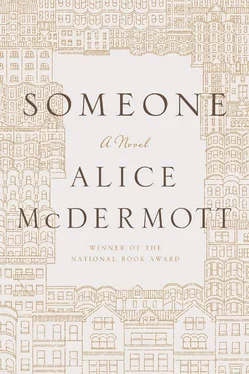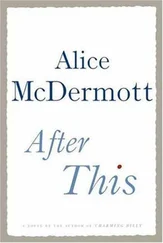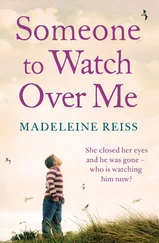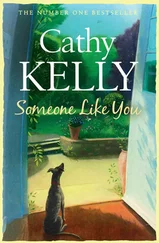When he stopped, I thought perhaps it was because he’d recognized someone ahead. But then he turned to me, and now, in the shadow of streetlight, his eyes reacquainted themselves with my face once again; indifference, once again, warming into deep pleasure. He pointed to the brownstone behind him.
“I’ve got to run upstairs for a minute,” he said, his voice full of a reluctance to leave me that well matched his newly recalled delight in my being there. “You want to come up or wait here?”
“This your house?” I said. And he only cocked his head to convey, Whose house do you think it is?
“I’ll come up,” I told him.
He and his mother lived on the top floor, like my mother and me. “Widows in aviaries,” he would say sometime later. He let himself in, calling, “Ma?” but there wasn’t a light on in the place, except that which came from the late dusk and the newly lit streetlight at the windows. He reached for a small lamp, pulled it on. Its amber shade and the bulb beneath it swayed a little.
“She must have gone out,” he said. “Have a seat. I won’t be a minute.”
He walked through the living room, into the adjoining dining room and then into another, the kitchen perhaps. I sat. The couch was covered in a dark blue brocade, lace doilies on the arms and across the back. There was a painting of the Holy Family over the boarded-up fireplace. The Virgin and good St. Joseph and the boy Jesus in white at the center. A small glass holding fading lilacs on the mantelpiece. Two more heavy chairs in the same midnight-blue brocade faced me. Beside one there was a sewing basket. On the small table between them, four oval photographs. I stood up and crossed to them. A wedding portrait of his parents, the father looking much like Walter might with a big mustache, a portrait of Walter as a baby, wide-eyed and propped up from behind, and then in knickers and a white collar, a huge First Communion ribbon on his arm, and then looking exactly like himself, although more thoughtful and more serious—or maybe just struggling to hold in a laugh—in his graduation gown.
I felt a twinge of envy, fool that I was in these first moments of my first foray into love’s irrational pains. Envy for the widowed mother who had known him all his life, who had heard his first words, dried his first tears—had they been for the shortened leg?—even envied the mustachioed father, now buried in Calvary, where my father, too, had gone, envied every happy moment Walter had lived that had no trace of me in it.
I heard his voice coming from the back of the apartment. He was on the phone. He seemed to be speaking seriously, repeating numbers. Was it his important job? Even now I can’t say whether or not the phone call was a ruse. I suspect he wasn’t that clever.
I returned to the couch. When he came back into the living room, he was carrying two opened bottles of beer. He offered and I refused, laughing a little at what struck me as the preposterousness of it, and he looked at the brown bottle and said, “Oh, but it’s already opened.” As if I had broken a promise. He placed the rejected beer on the radiator cover beside him and then moved to the couch. He sat next to me.
“My mother should be back soon,” he said, looking me over as if for the first time: my throat, my blouse, my belt, my hands in my lap. “She’ll want to say hello to you,” he said.
I nodded, pointed to the portraits on the small table. “Is that her wedding picture?” I asked, and he said, “Yeah.”
“She was pretty,” I said.
“I wouldn’t mind getting married,” he told me. And then took a drink of his beer. He began to talk about his job again. What a good job it was. What a great office. What an easy thing it would be for him to begin to save his money to get a nice place of his own. When he got married. He sat very close to me. Did I want to get married? he asked, and when I said, Sure I did, someday, that slow, delighted recognition in his eyes fell on me again. He leaned away as if to see me better. We might have been the only two people in all the vast universe who agreed that we would like to get married someday, he took such pleasure in my answer.
And children? he asked. Did I want to have children?
Well, sure.
Well, sure. His eyes, darker now in the dim light of the apartment, were on me alone, were all over my face, as if I, after all, was what they’d been searching for all evening.
When he leaned to kiss me, it was both my first real kiss and my first taste of beer. He held the opened bottle against my shoulder for a minute as he pressed toward me, dampening my blouse, so that there was the strong smell of beer as well as the light taste of it in my mouth. Then he lowered his arm across my lap to put the bottle on the floor and, moving up again, put his hand over my breast. Astonished and, perhaps, afraid—already I had learned the triumph and distress of his veering attentions—I made no move. Delicately—I thought at first that he was making an “okay” sign with thumb and forefinger just over my heart—he unbuttoned my shirt and then slipped his fingers inside. He pushed my bra aside. Exposed to the shadowy room, my breast seemed lit with its own light. He sighed and bowed his head. I felt the momentary terror of not knowing what he was going to do as he moved his mouth toward me and then felt it increase a hundredfold when I understood. He closed his mouth over my nipple. He pulled and tugged.
Of course, I had seen women nursing babies here and there, in closed-off rooms, and it was the recollection of this that muddled my emotions now. He breathed deeply, like an infant nursing, and I felt the warm air of his nostrils on my skin. I put a hand to his hair. Was this wrong? If I stopped him now, would he look at me again with that icy indifference, let his eyes drift away?
He put his hand to my spine and pressed me toward him. I felt his saliva turn cold on my skin, even as the room seemed to grow warmer around us. I felt his teeth on my flesh, lightly at first, but then in a stinging vise that made me pull in my breath. He clamped harder and I cried out, which only made him turn his head slightly as if to get a better grip on me with his molars. He might have drawn blood if there hadn’t been the sudden slam of the door in the downstairs vestibule. He paused, lifted his head. Slam of the interior door and maybe footsteps across the foyer. He said, “Cover up,” and then reached across my lap for the beer on the floor.
My poor pale breast was soggy and tender, the pink nipple distended, frighteningly transformed. I fumbled for my buttons. He leaned back on the couch, seemed to roll himself off it, the beer in one hand and the other hand pressed to his thigh. He walked, stooped, really limping now, toward the bottle he had left on the radiator. But then we heard the rattle of keys and another door opening on a floor below. He cursed and, with his back to me, hung his head, shaking it sorrowfully. And then without another word he limped out of the room again.
For a few minutes I sat alone under the shaded light. I felt it possible that he would not return. I felt for certain a warm trickle of blood was moving down my chest. When he came back, he seemed to have washed himself, hands and face, and combed water through his hair. He no longer had the bottle of beer, but he swung the second one off the radiator cover and carried it to the thick chair on the other side of the room. He sank into it and took a long drink. “When we get married,” he said, “you’re probably going to want to live on the parlor floor. Baby carriages and all. But I think it’s cheap. Everybody and his brother walking by your door. I think it’s better to be up high.” He finished off the bottle in two or three long gulps and put his hand to his chest and quietly belched, as if we were already married, and perhaps had been for quite some time. “I guess you’d better go,” he said amicably.
Читать дальше












